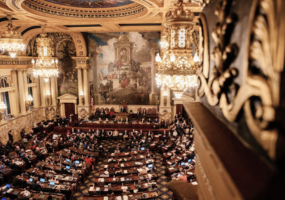 The PA House of Representatives and Senate were both in session last week, with PA Chamber-supported proposals related to tax appeals reform and drug manufacturing reaching the governor’s desk and several other business-related bills advancing in both chambers.
The PA House of Representatives and Senate were both in session last week, with PA Chamber-supported proposals related to tax appeals reform and drug manufacturing reaching the governor’s desk and several other business-related bills advancing in both chambers.
Here are some of the top legislative highlights from last week relevant to employers:
PA Bureau of Finance & Revenue Reform (S.B. 1051)
The House of Representatives voted unanimously to pass Senate Bill 1051 last Wednesday, and the Senate voted near-unanimously to concur, sending it to the governor’s desk for his signature.
This legislation would reform the process of resolving tax appeals with the Pennsylvania Bureau of Finance & Revenue (BF&R) by establishing a new independent, mediated settlement process as an alternative to the formal and lengthy court appeals process. This will provide for a quicker and fairer resolution to certain tax disputes.
BF&R receives approximately 4,200 appeals annually. BF&R must resolve each appeal within six months of its filing, absent an extension request; otherwise, the underlying Department of Revenue decision is upheld. Under current law, BF&R has no authority to direct a settlement process. We supported this legislation (CLICK HERE for our memo).
“On behalf of businesses statewide, we applaud the passage of Senate Bill 1051, which will streamline the process of resolving tax disputes in Pennsylvania and help job creators avoid costly litigation,” PA Chamber President and CEO Luke Bernstein said in a press release following the bill’s passage. “By allowing the BF&R to create a new settlement option, this bill gives taxpayers — especially small businesses — more flexibility to resolve disputes fairly and efficiently. This legislation is a win-win for businesses and our Commonwealth, and we thank Treasurer Stacy Garrity, Senator Hutchinson, and Representative Briggs for their leadership in advancing this important reform.”
Treasurer Garrity noted that 500 cases annually could be resolved under S.B. 1051’s settlement process. “This will make tax appeals much fairer for Pennsylvania families and businesses,” she stated. “These reforms will remove bureaucratic obstacles and implement a settlement process to streamline the appeal process. Huge thanks to Senator Hutchinson and Representative Briggs, and overwhelming bipartisan majorities in both chambers, for working to create an even playing field for Pennsylvania taxpayers.”
Statutory Cap Reform for Catastrophic Cases (S.B. 1300)
The Senate voted 26-24 to pass Senate Bill 1300 last Tuesday.
This legislation would increase the statutory caps on how much money an individual could recover from catastrophic lawsuits against state and local governments. These caps allow for responsible fiscal planning and stewardship of taxpayer funds, while also permitting reasonable recovery.
The Legislative Budget and Finance Committee recently reported that only one percent of the claims brought against local and state agencies are not fully satisfied under the current statutory caps. Senate Bill 1300 addresses those cases and substantially increases the current limits for recovery in the most serious of cases.
We supported this legislation (CLICK HERE for an earlier memo), which now goes to the House Judiciary Committee.
Prescription Drug Virtual Manufacturing License (H.B. 2084)
The Senate voted unanimously to pass House Bill 2084 last Wednesday.
This legislation would establish a “Virtual Manufacturer License” in Pennsylvania. A virtual manufacturer is a company that sells their own prescription drug products and/or medical devices but contracts out the manufacturing and distribution operations.
The Commonwealth currently issues a “Certificate of Record” for virtual manufacturers. The Certificate of Record is not a license, and therefore, Pennsylvania virtual manufacturers cannot distribute prescription drugs in states (such as New York and Ohio) that do not accept certificates of record. This legislation would make the distribution of prescription drug products and/or medical devices more efficient in the 34 states requiring licensure of virtual manufacturers.
We supported this legislation, which now awaits the governor’s signature to become law.
Direct Deposit for Workers’ Compensation Payments (S.B. 1232)
The House of Representatives voted to advance Senate Bill 1232 last week.
This legislation would allow workers’ compensation claimants to request payment of benefits by direct deposit or employers to require payment of benefits by direct deposit.
The bill would modernize and streamline the Workers Compensation Act by establishing a regulatory framework to allow employers to make worker’s compensation payments by direct deposit. These reforms were unanimously recommended by the Workers’ Compensation Advisory Council.
We supported this legislation, which passed the Senate in July, was amended and passed by the full House, and is now pending a final concurrence vote by the Senate.
Design Build Best Value Procurement (H.B. 1833)
The Senate Transportation committee voted 13-1 to advance House Bill 1833 last Wednesday.
This legislation would allow PennDOT and the Turnpike Commission to use Design Build Best Value (DBBV) as an alternative procurement process for infrastructure design and construction.
DBBV is a proven and viable means to achieve a more effective build-out and maintenance of the infrastructure system, particularly when a project involves increased complexity and innovation. This method has been successfully implemented in other states to produce cost savings and shorten build timelines, especially for large, complex infrastructure projects.
We supported this legislation (CLICK HERE for our memo), which now heads to the full Senate.